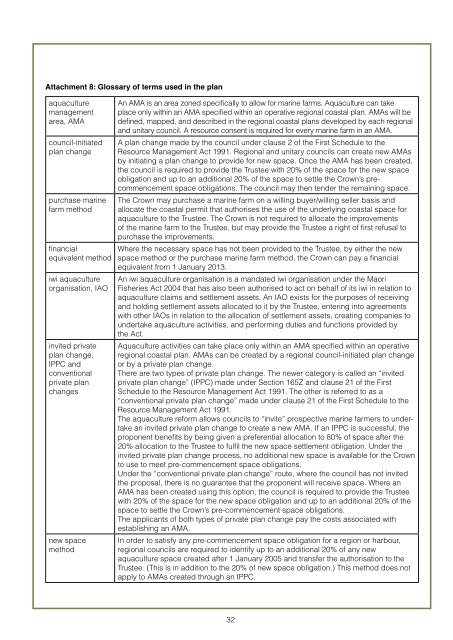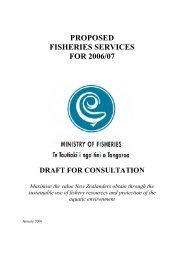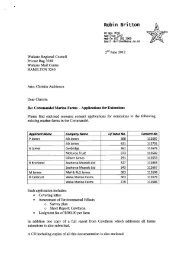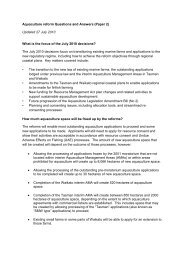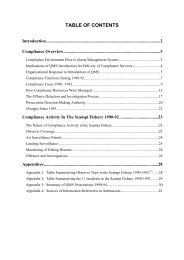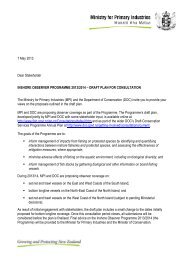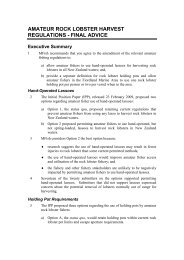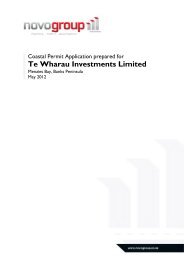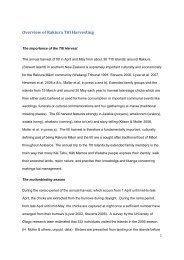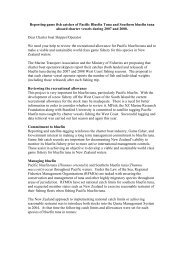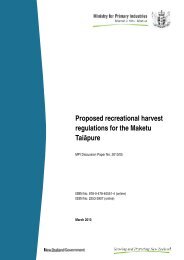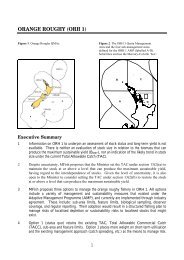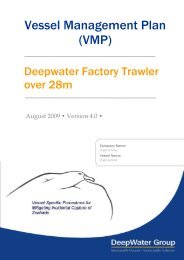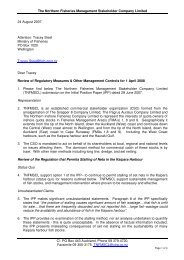maori commercial aquaculture settlement - Ministry of Fisheries
maori commercial aquaculture settlement - Ministry of Fisheries
maori commercial aquaculture settlement - Ministry of Fisheries
Create successful ePaper yourself
Turn your PDF publications into a flip-book with our unique Google optimized e-Paper software.
Attachment 8: Glossary <strong>of</strong> terms used in the plan<br />
<strong>aquaculture</strong><br />
management<br />
area, AMA<br />
council-initiated<br />
plan change<br />
purchase marine<br />
farm method<br />
financial<br />
equivalent method<br />
iwi <strong>aquaculture</strong><br />
organisation, IAO<br />
invited private<br />
plan change,<br />
IPPC and<br />
conventional<br />
private plan<br />
changes<br />
new space<br />
method<br />
An AMA is an area zoned specifically to allow for marine farms. Aquaculture can take<br />
place only within an AMA specified within an operative regional coastal plan. AMAs will be<br />
defined, mapped, and described in the regional coastal plans developed by each regional<br />
and unitary council. A resource consent is required for every marine farm in an AMA.<br />
A plan change made by the council under clause 2 <strong>of</strong> the First Schedule to the<br />
Resource Management Act 1991. Regional and unitary councils can create new AMAs<br />
by initiating a plan change to provide for new space. Once the AMA has been created,<br />
the council is required to provide the Trustee with 20% <strong>of</strong> the space for the new space<br />
obligation and up to an additional 20% <strong>of</strong> the space to settle the Crown’s precommencement<br />
space obligations. The council may then tender the remaining space.<br />
The Crown may purchase a marine farm on a willing buyer/willing seller basis and<br />
allocate the coastal permit that authorises the use <strong>of</strong> the underlying coastal space for<br />
<strong>aquaculture</strong> to the Trustee. The Crown is not required to allocate the improvements<br />
<strong>of</strong> the marine farm to the Trustee, but may provide the Trustee a right <strong>of</strong> first refusal to<br />
purchase the improvements.<br />
Where the necessary space has not been provided to the Trustee, by either the new<br />
space method or the purchase marine farm method, the Crown can pay a financial<br />
equivalent from 1 January 2013.<br />
An iwi <strong>aquaculture</strong> organisation is a mandated iwi organisation under the Maori<br />
<strong>Fisheries</strong> Act 2004 that has also been authorised to act on behalf <strong>of</strong> its iwi in relation to<br />
<strong>aquaculture</strong> claims and <strong>settlement</strong> assets. An IAO exists for the purposes <strong>of</strong> receiving<br />
and holding <strong>settlement</strong> assets allocated to it by the Trustee, entering into agreements<br />
with other IAOs in relation to the allocation <strong>of</strong> <strong>settlement</strong> assets, creating companies to<br />
undertake <strong>aquaculture</strong> activities, and performing duties and functions provided by<br />
the Act.<br />
Aquaculture activities can take place only within an AMA specified within an operative<br />
regional coastal plan. AMAs can be created by a regional council-initiated plan change<br />
or by a private plan change.<br />
There are two types <strong>of</strong> private plan change. The newer category is called an “invited<br />
private plan change” (IPPC) made under Section 165Z and clause 21 <strong>of</strong> the First<br />
Schedule to the Resource Management Act 1991. The other is referred to as a<br />
“conventional private plan change” made under clause 21 <strong>of</strong> the First Schedule to the<br />
Resource Management Act 1991.<br />
The <strong>aquaculture</strong> reform allows councils to “invite” prospective marine farmers to undertake<br />
an invited private plan change to create a new AMA. If an IPPC is successful, the<br />
proponent benefits by being given a preferential allocation to 80% <strong>of</strong> space after the<br />
20% allocation to the Trustee to fulfil the new space <strong>settlement</strong> obligation. Under the<br />
invited private plan change process, no additional new space is available for the Crown<br />
to use to meet pre-commencement space obligations.<br />
Under the “conventional private plan change” route, where the council has not invited<br />
the proposal, there is no guarantee that the proponent will receive space. Where an<br />
AMA has been created using this option, the council is required to provide the Trustee<br />
with 20% <strong>of</strong> the space for the new space obligation and up to an additional 20% <strong>of</strong> the<br />
space to settle the Crown’s pre-commencement space obligations.<br />
The applicants <strong>of</strong> both types <strong>of</strong> private plan change pay the costs associated with<br />
establishing an AMA.<br />
In order to satisfy any pre-commencement space obligation for a region or harbour,<br />
regional councils are required to identify up to an additional 20% <strong>of</strong> any new<br />
<strong>aquaculture</strong> space created after 1 January 2005 and transfer the authorisation to the<br />
Trustee. (This is in addition to the 20% <strong>of</strong> new space obligation.) This method does not<br />
apply to AMAs created through an IPPC.<br />
32


